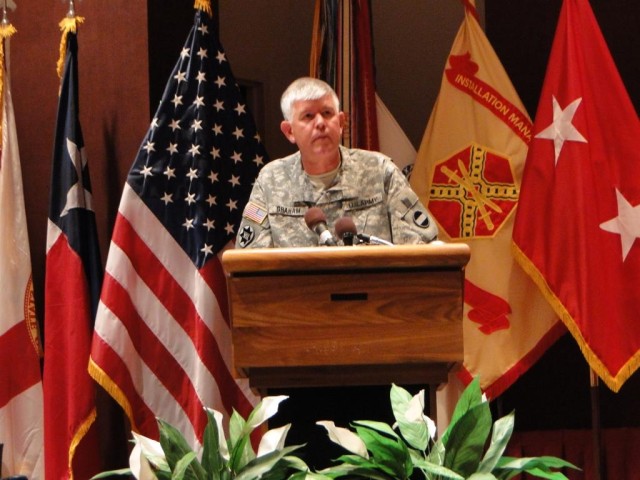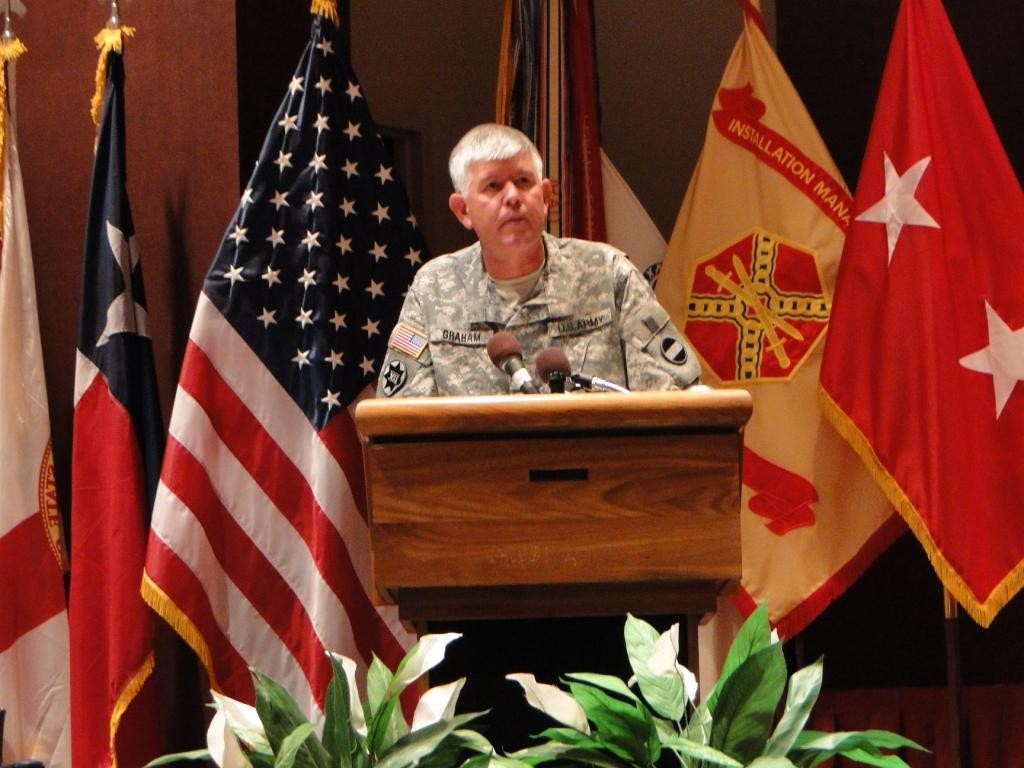
He asked for understanding and patience.
He apologized for his tissue and prepared speech, both tools he uses to help hold back his own tears.
And he touched the hearts of the 650-plus employees who heard his message of sorrow, loss, bewilderment, faith, hope and love.
Maj. Gen. Mark Graham, deputy chief of staff of the G-3/5/7 at Forces Command, Fort McPherson, Ga., told his heartbreaking story of the death of his two sons - one from suicide, the other from an improvised explosive device in Iraq - to a packed Bob Jones Auditorium and to other Redstone Arsenal employees via closed circuit television Thursday. The event was hosted by the Garrison's Employee Assistance Program in recognition of National Suicide Prevention Week and National Suicide Prevention Month.
"I can hardly get through this and I've done this many times," he said of his speech. "Two of my sons are dead and it is hard for me ... My sons died fighting different battles. The loss of both sons was beyond comprehension."
After a moment of silence for the nation's fallen heroes - including those Soldiers who have died in combat or been wounded, and those who have died of suicide or are dealing with depression, post traumatic stress disorder and traumatic brain injury - Graham focused his comments on the suffering he and his wife Caroline have endured as they work together to come to grasp with the loss of a son to suicide.
"Fear and ignorance create a stigma," he said. "Suicide. Just the word 'suicide' makes many of you in this room uneasy and cringe. Many of you don't want to hear about it or talk about it. Just the word 'suicide' makes you pause, and brings up a multitude of emotions and judgments ... My son had an illness. Suicide is an illness that if left untreated potentially is as deadly as cancer or heart disease."
Graham's son Kevin was a top ROTC cadet at the University of Kentucky in 2003 who had been taking the drug Prozac to control his depression. He stopped taking Prozac in part because he didn't want Army officials to know he was taking medication when he signed in for ROTC advance camp in the summer of 2003. On June 21, 2003, he committed suicide.
Kevin's death was a jolt to his parents, and his sister and brother, Jeff. That jolt became even more electrifying on Feb. 19, 2004, when Jeff, a second lieutenant working to protect his platoon, was killed in a roadside bomb explosion in Kalidiyah, Iraq.
"Our journey tested our faith, rattled our moral courage and left us feeling truly empty at times ... With one phone call our world as we knew it was gone. We would never be the same," Graham said. "After six years, I still wake up sometimes thinking maybe this is a bad dream, maybe it is happening to somebody else. Our children were our whole world."
Graham said he and his wife had talked to their children about "alcohol, drugs, sex, even strangers" and told them "prayer, the proper diet, exercise and a good night's sleep" would help them through anything. But they had not talked to them about suicide and suicide prevention.
After both deaths, the Graham family was blessed with an outpouring of support from family and friends.
"That gave us courage to keep on living. Our hearts were so completely broken and our story so unbelievable ... We've found ways to channel our grief. We live one day at a time," he said.
In sharing their grief, Graham and his family have learned that others have similar sorrows.
"I was astounded at the horrible things people are carrying on their hearts ... No one is isolated from hardship. No one. Everyone is going through something."
After his second son's death, Graham was not sure he could continue to serve his country. He attended family reunion events for deployed Soldiers, wishing his son would walk through the door with the other Soldiers. He questioned why it seemed the prayers of others were seemingly answered and his weren't.
But a daily devotional from "Streams in the Desert" read aloud by his wife one morning soon after their second son's death "seemed like a sign that there was still a mission for us and that mission was to support Soldiers."
Other Soldiers were dying - in Afghanistan and Iraq, in car accidents, by suicide - and Graham and his wife dedicated their lives to helping others through their loss and, especially, helping to prevent the death of more Soldiers to suicide. They began to work in support of suicide prevention campaigns both within the Army and on college campuses, and both have committed their free time to speaking to groups about their experience.
"We personally knew the pain these families were feeling," he said. "We could comfort the broken hearts, and by doing that others seemed to help us more than we helped them. Finally, we were able to smile a little and laugh a little. We realized our sons had more joy in their lives than others experience in a lifetime.
"And we realized our sons were not really gone. They are so much a part of us. We carried them wherever we went."
Graham was attending a conference at Fort Benning, Ga., on Sept. 22, 2004, Jeffrey's birthday, when he visited the barracks where Kevin stayed when he attended airborne school. During the visit, he was surprised by his two-star boss from Fort Sill, Okla., who arrived to congratulate him on making the list for brigadier general. Graham felt the closeness of his two Soldier sons in that moment.
"I knew I was where I was supposed to be and there was still a mission for me in the Army," said Graham, who now, as a major general, wears the name of Jeffrey under one of his general's stars and the name of Kevin under the other. He also wears a bracelet bearing the names of his two sons.
Graham and his wife see signs of hope - "butterflies, lady bugs and rainbows appear at incredible times" and "beautiful coincidences come from the hand of God" - and find ways to connect to others because "we value each relationship and take nothing for granted." Their daughter has graduated from nursing school and has found new happiness in her life.
"Life can continue to move forward and with great triumphs and give us hope," Graham said.
Though there will always be a "hole in my heart," Graham said "my boys will never be a weakness in my life. They will be my strength. Everything we do is in the memory of our sons."
Graham and his wife use Kevin's suicide to raise awareness of the dangers of not treating depression, post traumatic stress disorder, traumatic brain injury and other mental illnesses.
"We speak for Soldiers who don't have a voice. We've got to encourage people to seek the assistance they need without fear of embarrassment or stigma ... We must care for our Soldiers and rid our Army of this stigma. We must encourage those in need ... One death from suicide is too many," he said.
Besides the stigma of getting treatment, suicide is also difficult to prevent because signs of a possible suicide can be hard to detect.
Graham still often asks himself "how could I have missed this'" and recalls signs that, at the time, were not obvious, but that are now glaring.
"I'm living with this every day. Don't let this happen to you," he said.
Suicide is the second leading cause of death among young adults and college students, ages 18 to 25.
Those needing information about suicide prevention or who are seeking counseling, can turn to several sources of support. The Army's ACE (Ask, Care, Escort) program/Military OneSource can be reached at 1-800-342-9647, and the VA Readjustment Counseling Service at 1-800-271-1000. The National Suicide Prevention Hotline is 1-800-273-8255. In the community, Crises Services of North Alabama can be reached at 716-1000 and the Huntsville/Madison County Mental Health Services at 533-1970. On post, assistance for suicide prevention can be obtained through the Employee Assistance Program (842-0895 or 842-9897), Fox Army Health Center Behavioral Medicine (955-8888, ext. 1930) and Chaplain Services (842-2174).

Social Sharing